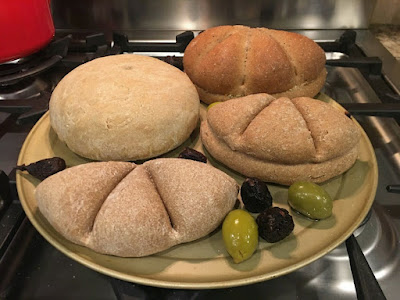Words can have long, complex and, at times, vague and, the topic here, disputed “biographies”.
The post listing the names of fruit originally appeared in a
different group where the word kivium (kiwi) was questioned.
According to a member of that group, there could be no Classical Latin word
given that the Romans did not have kiwi fruit and, therefore, was most likely
invalid.
While the writer is correct in that the Romans did not have
kiwis, he did not take it to its logical conclusion that there were other
fruits which they didn’t have e.g. pineapples and tomatoes despite which Latin
does have words for them, and he did not question those. He’s right that there
is no Classical Latin word for kiwi – or pineapple or tomato.
However, that there are no Latin words for them is not the
case.
Long after Latin was under the “ownership” of the Romans, it
continued to develop through the Mediaeval and Renaissance periods, and to
embrace new vocabulary. As discoveries were made we can read documents
pertaining to, for example, botany, zoology and medicine which were written in
Latin because the language was in common use amongst the universities. An
academic in England could write research in Latin and know that it could be
read in institutions throughout Europe. A post some time back dealt with observations
of the weather; it is written in Latin but by a researcher in Bohemia in the
18th century.
https://en.wikipedia.org/wiki/Neo-Latin
Latin did not stop after the Renaissance. It continues to
incorporate new vocabulary thereby allowing us to talk about football,
supermarkets, car parks … and flying saucers! Cicero didn’t talk about any of
those, but people still want to speak or write Latin and to relate it to the
contemporary world around them. Latin can facilitate that, and, personally, I
think that, by active use of the language, it helps to reinforce the grammar.
If we were to classify Latin as “dead” on the basis that there are no native
speakers left, then, by analogy, Esperanto should never have been created by
Zamenhof since there were never any native speakers in the first place!
While the main aim of this group is to present the Latin
language in order, in the long term, to be able to read the Roman authors, it
does not preclude discussing Latin that does not belong to the Classical period
provided that it is attested using a legitimate source.
Below are links to sites which will list vocabulary that is
not Classical Latin
https://neolatinlexicon.org/latin/
https://latinlexicon.org/latinitas_recens_latine.php
https://neolatinlexicon.org/sources/
https://www.vatican.va/.../rc_latinitas_20040601_lexicon...
https://la.wikipedia.org/wiki/Index_verborum_neolatinorum
https://archive.org/det.../revisedmedievall0000lath/mode/2up
(Note: this link requires a log-in)
The other source is Traupman’s Conversational Latin
for Oral Proficiency which is packed with Neo-Latin vocabulary; the
book is copyright – all I’m saying is “Seek and ye shall find”
On file in the group:
[i] a primer of Medieval Latin (Beeson)
[ii] calepinusnovus2002-french-latin.pdf
[iii] calepinusnovus2002-latin-french.pdf
[iv] Centre for Mediaeval Studies: core Mediaeval Latin
vocabulary
[v] index verborum neolatinorum – Vicipaedia
[vi] lexicon_latinum_morgan.pdf
If you look up a word in Wiktionary – and it isn’t there or
the meaning isn’t the same – you can’t conclude that it doesn’t exist. If you
move on to Lewis and Short and you get a similar result, you can’t conclude
that it doesn’t exist. Before firing missiles on FB or challenging your
opponent in Latin Scrabble, you may need to do a bit of digging!
Image #1:
https://neolatinlexicon.org/latin/kiwi/
Source: LRL - Lexicon Recentioris Latinitatis (Vatican)
Image #2: examples of Neo-Latin from Traupman
Image #3: introduction to the Primer of Medieval Latin (Beeson); the introduction to this book (p13ff) is interesting in that it gives a great deal of information about the differences between Mediaeval and Classical Latin, and refers to the creation of new words or changes in their meanings.






































